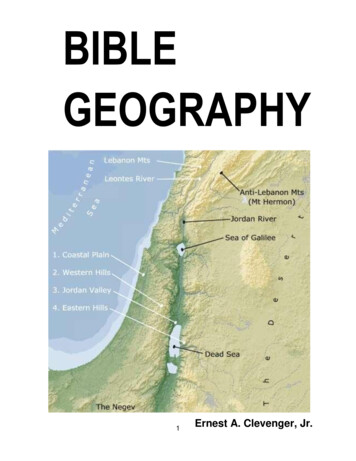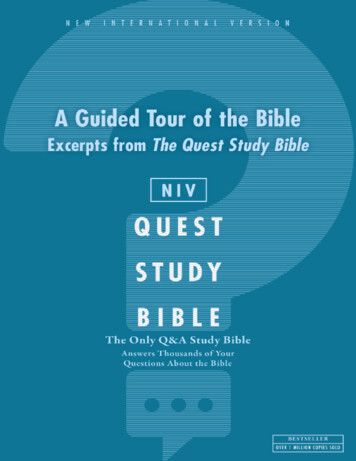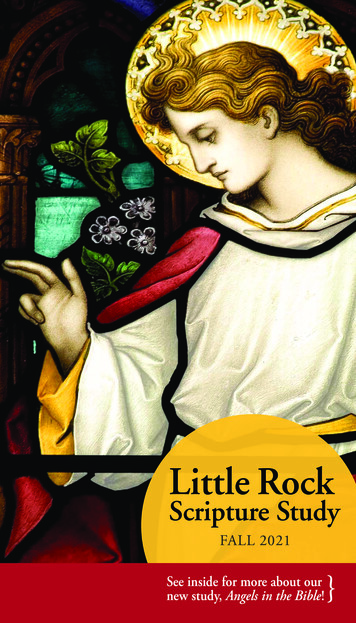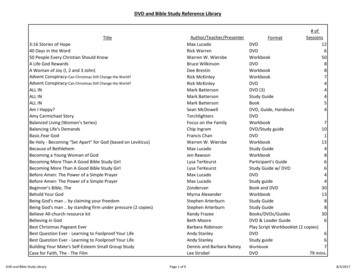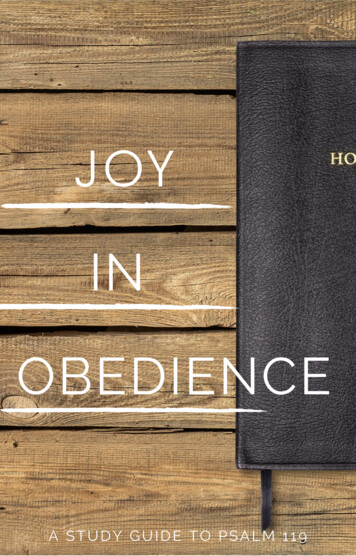
Transcription
TITLEJoshua’s birth name was Hoshea (Heb. lit. “salvation,” Num. 13:8), but Moses called him “Joshua”(Heb. yehoshua, lit. “the Lord saves”; Num. 13:16). “Jesus” is the Greek form of the Hebrew “Joshua.”While parts of the book appear to be written after Joshua’s death (Josh. 10:12, 13; 24:29– 33), traditionidentifies Joshua as the primary author of the work. Assuming that Joshua and his fellow spy Calebwere of similar age when they were part of the original spy mission to Canaan 40 years earlier,Joshua would have been about 80 years old when the Israelites entered the Promised Land.AUTHORJoshua was divinely prepared to lead the Israelites (see chart, Preparation for Leadership). Hehad been a slave, a free man, a man without a country, the general of an ill-equipped nomadicarmy, a conqueror against incredible odds, a land agent, a statesman, and a settler. He witnessedextraordinary miracles: the 10 plagues of Egypt, the parting of the Red Sea and the Jordan River, themiraculous provision of food for 40 years in the wilderness, water flowing from rocks, city wallsfalling down, the sun standing still, and army after army falling away at his approach.DATEThe Book of Joshua covers approximately 30 years during what is now called the Late BronzeAge (1500– 1200 b.c.). The actual invasion probably occurred about 1405 b.c. during the reign ofAmenhotep III in Egypt (see Deut. 1:3– 8; 1 Kin. 6:1).BACKGROUNDSettingThe first five books of the Bible (the Pentateuch) provide background for the Book of Joshua. Thepeople’s preparation began in Genesis with the promise of the land to Abraham, Isaac, and Jacob(Gen. 12:1– 3, 7; 13:15; 15:7, 18; 17:8; 26:3; 28:13). Preparation continued, as for two centuries Abraham’sdescendants lived in the land but never fully controlled it.For the next four centuries the Israelites lived in Egypt. The Book of Exodus records their escape fromslavery and the giving of the Law. Leviticus prepares them for worship. Numbers and Deuteronomyprovide for them a civic structure. Even the language in Joshua’s account detailing Israel’s entry9780718086749 int 02 jos est nkjv wsb FINAL.indd 31410/29/16 3:04 PM
into the land is similar to the Deuteronomy description of Israel’s preparation for entry into thePromised Land. The Book of Joshua refers to the Pentateuch as a completed entity normative for thatgeneration (Josh. 1:7, 8).Although the Law and Israel’s special covenant relationship with God defined the nation’s identity,God also had promised the Israelites a land of their own. The Book of Joshua is the record of theirconquest of that land under God’s leadership. Canaan, the strategic land bridge connecting Africawith Asia and ultimately with Europe, is a unique land (see chart, Terminology for the Land). It linksthe Indian Ocean (via the Red Sea) with the Atlantic Ocean (via the Mediterranean). It claims moremilitary occupations, battles, and blood baths than any country on the globe; at least 30 worldpowers have trampled its soil. People living in this land need a special relationship with theirdefender.The Promised Land was a pagan land. Though God had placed a witness to Himself in the land withthe election of Abraham and his descendants as His chosen people, the people of Canaan persistedin the worship of numerous gods and goddesses. By the time of the conquest, the religious climateof Canaan had grown so decadent that a variety of detestable practices expressly forbidden to theIsraelites, including cult prostitution and child sacrifice, had evolved (Lev. 18:21; Deut. 12:31; 23:17).Egypt, the political Goliath of the day, showed little concern. Other political powers had waned, andCanaan’s own native inhabitants lacked unity. The timing for the Israelite invasion was perfect.PurposeThe book is a reminder to the Israelites, including future generations, that their land was a giftfrom God and that their possession of the land was the fulfillment of His promise. What began as apromise to Abraham, Isaac, and Jacob, and continued through Moses now would be fulfilled underJoshua.The faithfulness of Joshua’s generation would be tested in battle. Greater tests would come,however, as future generations changed from the nomadic life of herdsmen to a new life aspermanent settlers.THEMESThough Joshua is a history book, its primary theme is the faithfulness of God as exhibited repeatedlythrough His presence, power, protection, provision, and fulfilled promises. A secondary theme is thefaithfulness of God’s people. The Israelites were about to enter an advanced culture of experiencedfarmers whose life was tied elaborately to the worship of pagan gods of nature; those gods wouldbe a constant temptation to the Israelites. Their willingness to obey God would be tested, and manytimes they failed the test. Yet God’s faithfulness never ceased.9780718086749 int 02 jos est nkjv wsb FINAL.indd 31510/29/16 3:04 PM
OUTLINEI. The Conquest of the Land (1:1— 12:24)A. Preparation for conquest (1:1— 5:15)1. Preparing Joshua (1:1– 9)2. Preparing the leaders (1:10– 18)3. Preparing the strategy (2:1– 24)4. Preparing the approach (3:1— 4:24)5. Preparing the people (5:1– 15)B. The conquest of the land (6:1— 12:24)1. The conquest of Jericho (6:1– 27)2. The conquest of Ai (7:1— 8:29)3. The renewal of the covenant (8:30– 35)4. The treaty with the Gibeonites (9:1– 27)5. The conquest of southern Canaan (10:1– 43)6. The conquest of northern Canaan (11:1– 15)7. A summary of the conquest (11:16— 12:24)II. The Division of the Land (13:1— 21:45)A. The assignment of land to individual tribes (13:1— 19:51)1. Instructions to Joshua (13:1– 7)2. Borders for the eastern tribes (13:8– 33)3. Borders for the western tribes (14:1— 19:51)B. The assignment of special cities (20:1— 21:45)1. The cities of refuge (20:1– 9)2. The cities of the Levites (21:1– 45)III. The Settlement of the Land (22:1— 24:33)A. The settlement of the eastern tribes (22:1– 34)1. Joshua’s message to the eastern tribes (22:1– 9)2. The building of an altar by the eastern tribes (22:10– 34)B. The settlement of the western tribes (23:1— 24:33)1. Joshua’s farewell address to all Israel (23:1— 24:24)2. The covenant at Shechem (24:25– 28)3. The death and burial of godly leaders (24:29– 33)9780718086749 int 02 jos est nkjv wsb FINAL.indd 31610/29/16 3:04 PM
317God’s Commission to Joshua1 fter the death of Moses the servant ofAthe Lord, it came to pass that the Lordspoke to Joshua the son of Nun, Moses’ assistant, saying: 2“Moses My servant is dead.Now therefore, arise, go over this Jordan,you and all this people, to the land which Iam giving to them— the children of Israel.3Every place that the sole of your foot willtread upon I have given you, as I said to Moses. 4From the wilderness and this Lebanonas far as the great river, the River Euphrates,all the land of the Hittites, and to the GreatSea toward the going down of the sun, shallbe your territory. 5No man shall be able tostand before you all the days of your life; asI was with Moses, so I will be with you. I willnot leave you nor forsake you. 6Be strongand of good courage, for to this people youshall divide as an inheritance the land whichI swore to their fathers to give them. 7Onlybe strong and very courageous, that youmay observe to do according to all the lawwhich Moses My servant commanded you;do not turn from it to the right hand or tothe left, that you may prosper wherever yougo. 8 This Book of the Law shall not departfrom your mouth, but you shall meditatein it day and night, that you may observe todo according to all that is written in it. Forthen you will make your way prosperous,and then you will have good success. 9Have Inot commanded you? Be strong and of goodcourage; do not be afraid, nor be dismayed,for the Lord your God is with you whereveryou go.”1:1The Israelites had been at the border of the Promised Land40 years earlier (Num. 13:1— 14:45), at which time the peoplehad doubted that God could accomplish His promises. Theyrefused to enter Canaan, and their disobedience resulted inGod’s judgment (see chart, Tale of Two Committees). None ofthe adults except Joshua and Caleb were allowed to enter theland (Josh. 5:6; see chart, Caleb: Portrait of a Hero). The deathof Moses completed this judgment. God was ready to lead theIsraelites into the land as He had promised. Joshua’s positionas “assistant” indicates a unique position of personal service,and thus the new leader of Israel began with a direct communication from the Lord (see chart, Preparation for Leadership).1:2 The crossing of the Jordan was considered the first stepof the campaign (Deut. 32:47; Josh. 3:10– 13). Although normally not very wide this close to Jericho, at flood stage the rivercould have been a mile wide.1:3 Treading upon the soil symbolized acceptance of property ownership (Deut. 11:24; Josh. 14:9); handing your shoe toanother symbolized the transfer of land (Ruth 4:7, note). Thetransaction bound the new owners to the law, the land, and9780718086749 int 02 jos est nkjv wsb FINAL.indd 317Joshua 1:15The Order to Cross the Jordan10 Then Joshua commanded the officers ofthe people, saying, 11“Pass through the campand command the people, saying, ‘Prepareprovisions for yourselves, for within threedays you will cross over this Jordan, to go into possess the land which the Lord your Godis giving you to possess.’ ”GOALS ARE A JOINT EFFORT PROCESS:GETTING IN TOUCH WITH OUR HEARTAND SETTING A COURSE; THEN DEPENDINGON AND BEING WILLING FOR GODTO DIRECT US ONE STEP AT A TIME.Sheila West12And to the Reubenites, the Gadites, andhalf the tribe of Manasseh Joshua spoke, saying, 13“Remember the word which Moses theservant of the Lord commanded you, saying,‘The Lord your God is giving you rest and isgiving you this land.’ 14 Your wives, your little ones, and your livestock shall remain inthe land which Moses gave you on this sideof the Jordan. But you shall pass before yourbrethren armed, all your mighty men of valor, and help them, 15until the Lord has givenyour brethren rest, as He gave you, and theyalso have taken possession of the land whichthe Lord your God is giving them. Then youshall return to the land of your possessionand enjoy it, which Moses the Lord’s servantthe god of that region. God used the same formula (Law, Josh.1:7, 8; Land, v. 2; Himself, vv. 5, 9).1:6 Repetition was typically used by the Hebrews for emphasis, with the threefold repetition as the highest degree (vv. 6,7, 9; see also Is. 6:3; John 21:15– 17). God’s renewed promise toguide Joshua not only through the conquest but also throughthe distribution of the land followed (Josh. 13– 21; see map, TheDivision of the Land).1:8 The command to meditate on God’s Law (the Torah) included incorporating its teachings into one’s lifestyle as thebasis of true success in life.1:12– 15 The Reubenites, the Gadites, and half the tribe ofManasseh already had claimed and settled the land east of theJordan with the understanding that they would fight alongsidetheir brothers until the rest of the land was conquered. Thiscommitment was important for the unity of the nation anddemonstrated the faith of these tribes that God would providefor and protect those left behind while the fighting men wereaway (Num. 34:14, 15).10/29/16 3:04 PM
318Joshua 1:16 Preparation for LeadershipThe relationship between Moses and Joshua shows a mentoring pattern for developing leadership qualities.EARLY YEARS Joshua was born in slavery and oppression (Ex. 1:13). He was among those who cried out toGod for deliverance (Ex. 2:23).THE EXODUS Joshua observed the plagues (Ex. 7:14—12:29). He saw the impotency of Egypt’s gods(Ex. 7:10–13). He observed Pharaoh’s humiliation (Ex. 8:8–10). He witnessed the miraculousprovision of God (Num. 11:31–33).LEADERSHIPTRAINING Joshua was the leader of a tribe (Num. 13:2, 8, 16). He stood for God at the risk of his own life(Num. 14:6–10). Though in the minority, he wholly followed God (Num. 32:11, 12). He co-ledthe people (Num. 27:18–23). He led battles (Ex. 17:9, 10).OBSERVATION OFMOSES Moses delegated authority (Ex.18:17–26). He encountered God on Mt. Sinai (Ex. 24:12,13). He experienced the rebellion of the people (Num. 12:1–15; 16:1–50). He respondedto complaining (Ex. 17:1–7). He experienced frustration at the disobedience of the people(Ex. 16:25–30). He obeyed God (Ex. 40:16–19).TEACHING BY MOSES Joshua received the book written by Moses (Ex. 17:14). He shared authority with Moses(Num. 27:18–23). Moses gave instructions to Joshua (Josh. 1:7).OBSERVATIONSOF JOSHUA’SPREPARATION Joshua learned patience (40 years waiting to get into the land). He learned to seekGod (Num. 27:15–18). He learned to obey only God (Num. 14:8, 9). He learned to lead(Num. 27:18–23).GOD’S CALL God told Moses that Joshua was the new leader (Num. 27:15–23). God told Joshua that he wasthe new leader (Josh 1:1–9). God showed the people Joshua was the leader (Josh. 3:7). Godpersonally appeared to Joshua (Josh. 5:13–15).GOD’S SPECIFICPROMISES Joshua would possess every place his foot would tread (Josh. 1:3). God would be withJoshua as He was with Moses (Josh. 1:5, 9). No one would be able to usurp Joshua’s position(Josh. 1:5). Joshua would prosper (Josh. 1:7).GOD’S INSTRUCTIONS Be strong and courageous (Josh. 1:6, 9). Observe all Moses’ commands (Josh. 1:7, 13). Meditate on the Book day and night (Josh. 1:8). Do not be afraid (Josh. 1:9).PUBLIC AFFIRMATION The people accepted him as Moses’ replacement (Josh. 1:16, 17). They gave him theirallegiance (Josh. 1:18). Leaders (priests) responded to him (Josh. 3:8–17; 4:16–18).JOSHUA’SLEADERSHIP Joshua acted quickly (Josh. 3:1). He sent only two spies, and they reported to him (Josh. 2:1,23). He relayed God’s promises to the people (Josh. 3:5, 8). He set up memorials (Josh. 4:1–9). He recognized and worshiped the real Commander (Josh. 5:13–15). He made mistakes (Josh.7:1–9). He experienced God’s direct involvement (Josh. 10:14). He administered the divisionof land (Josh. 13—19).EVALUATIONSOF JOSHUA’SLEADERSHIP Joshua practiced immediate obedience (Josh. 11:23). He learned from the past (Josh. 10:25). He held to God’s Word (Josh. 8:34, 35). He taught the people the importance of God’s Word(Josh. 23:6). He read God’s Word to the people (Josh. 8:35). In victory, he praised God(Josh. 8:30). He recognized that God fulfilled every need (Josh. 23:14). He continually gaveGod the credit (Josh. 3:5, 10; 4:23, 24; 23:3). He made a lifelong commitment (Josh. 24:15).gave you on this side of the Jordan towardthe sunrise.”16So they answered Joshua, saying, “Allthat you command us we will do, and wherever you send us we will go. 17Just as weheeded Moses in all things, so we will heed9780718086749 int 02 jos est nkjv wsb FINAL.indd 318you. Only the Lord your God be with you,as He was with Moses. 18 Whoever rebelsagainst your command and does not heedyour words, in all that you command him,shall be put to death. Only be strong and ofgood courage.”10/29/16 3:04 PM
319Joshua 2:10Tale of Two CommitteesSPIES OF MOSES (NUM. 13)SPIES OF JOSHUA (JOSH. 2)Number:Twelve men were chosen.Two men were helped and perhapsinspired by a woman—Rahab.Identification:The spies were named by Moses.The spies were chosen by Joshua.Debriefing Procedure:The spies reported directly to thepeople.The spies reported directly to Joshua.Report:The enemy is “bigger than we are.”“God is bigger” than any enemy.Committee Vote:Ten out of twelve agreed with thereport.100% supported the report.Debriefing Report:Mission impossible!Go for it!Action Taken:The people reacted in fear.The people acted in faith.Results:The people wandered 40 more years.The people settled in the Landof Promise.Rahab Hides the Spies2 ow Joshua the son of Nun sent out twoNmen from Acacia Grovea to spy secretly,saying, “Go, view the land, especially Jericho.”So they went, and came to the house of aharlot named Rahab, and lodged there. 2Andit was told the king of Jericho, saying, “Behold, men have come here tonight from thechildren of Israel to search out the country.”3So the king of Jericho sent to Rahab, saying, “Bring out the men who have come toyou, who have entered your house, for theyhave come to search out all the country.”4 Then the woman took the two men andhid them. So she said, “Yes, the men cameto me, but I did not know where they werefrom. 5And it happened as the gate was being2:1 Ancient Jericho (Heb. lit. “moon” and thus “moon city”)may be the oldest city in the world and likely was dedicatedto the worship of a moon god. Located about five miles westof the Jordan River, Jericho was an oasis in the Dead Sea area.This fortress city controlled the entrance to the land. The conquest of Jericho formed the initial stage of Joshua’s militarystrategy of “divide and conquer.” Rahab’s house was probablybuilt over the gap between the two walls, 12 to 15 feet apart,a common practice in that day (v. 15). Rahab is described asa “harlot” (Heb. zanah). There is no evidence that she was asacred prostitute in the service of her pagan gods (see Rahab). Prostitution was practiced commonly in the Canaaniteculture. Lodging in the house of a prostitute may have been away for the spies to avoid detection when entering and leavingthe city.9780718086749 int 02 jos est nkjv wsb FINAL.indd 319shut, when it was dark, that the men wentout. Where the men went I do not know;pursue them quickly, for you may overtakethem.” 6(But she had brought them up tothe roof and hidden them with the stalks offlax, which she had laid in order on the roof.)7 Then the men pursued them by the road tothe Jordan, to the fords. And as soon as thosewho pursued them had gone out, they shutthe gate.8Now before they lay down, she came upto them on the roof, 9and said to the men:“I know that the Lord has given you theland, that the terror of you has fallen on us,and that all the inhabitants of the land arefainthearted because of you. 10For we have2:1 a Hebrew S hittim 2:9The spies needed help, and Rahab needed protection.Apparently of all the inhabitants of Jericho, Rahab alonebelieved in Israel’s God. Her words are an indictment of theIsraelites whose unbelief caused them to lose 40 years in thewilderness. In effect, she told them the battle had been wonwhen God delivered them from Egypt (vv. 10, 11). Rahab didlie to protect the spies (vv. 4, 5), for deception and espionageare part of warfare. Scripture unequivocally forbids lying, andnowhere does God condone Rahab’s lying (Prov. 12:22). However, we must affirm Rahab’s great faith and leave any judgment of her to God. Extenuating circumstances challengedthe new faith of this resourceful woman, and God honoredher faith by giving her a place in the lineage of the Messiah(Matt. 1:5).10/29/16 3:04 PM
320Joshua 2:11Rahab :DISCERNING DELIVERERRahab was obviously an intelligent woman. She showed a remarkable knowledge of the recenthistory of Israel as well as of what God was doing for the Israelites when they approached hercountry. In fact, she seemed more aware of God’s intervention for Israel than Israel was (noticethe similarity of her words in Josh. 2:9– 11 with Josh. 1:2, 11, 13). In addition, she obtained anagreement for protection from the spies, hid them, and outsmarted her own people when theycame looking for them.Rahab also showed initiative in arranging for the deliverance of her entire family. She was awoman of great courage. Siding with the Israelites was treason, punishable by death, not only forherself but also for all her family. Once she made her decision, there was no turning back.Finally, Rahab was a woman with spiritual insight. She recognized the disparity betweenIsrael’s God and the gods she and her people served. Israel’s God was supreme — He did notshare the rule in the heavens and the earth the way their gods reportedly did (Josh. 2:11). Rahab’sinitial confession of faith is seen in the use of the name Yahweh. Without any support or inputfrom her world or Israel’s, she claimed the covenant name God gave to Moses when the Israelitesfirst left Egypt (Ex. 3:14). Then, again without any encouragement from others, she acted on hercommitment by hiding the spies. This kind of faith was not often seen in God’s people in the OldTestament, let alone from a Gentile harlot.Rahab is a role model for making the right decisions and standing firm, even when it meansgoing against your own peers. No wonder God wanted to honor her faith and courage by placingsuch a woman in the line of the Messiah. Boaz, one of the most gentle and godly men in the OldTestament, was her offspring (see Matt. 1:5 and the Book of Ruth; see chart, The Family Tree ofJesus). God honored Rahab’s faith and courage by placing her in the lineage not only of Israel’sgreat King David (Matt. 1:6) but also of Jesus, the King of kings (Matt. 1:1).See also Matt. 1:5; Heb. 11:31; James 2:25; notes on Decision Making (1 Cor. 8); Heroines (Heb. 11)heard how the Lord dried up the water ofthe Red Sea for you when you came out ofEgypt, and what you did to the two kingsof the Amorites who were on the other sideof the Jordan, Sihon and Og, whom you utterly destroyed. 11And as soon as we heardthese things, our hearts melted; neither didthere remain any more courage in anyonebecause of you, for the Lord your God, He isGod in heaven above and on earth beneath.12Now therefore, I beg you, swear to me bythe Lord, since I have shown you kindness,that you also will show kindness to my fa-ther’s house, and give me a true token, 13andspare my father, my mother, my brothers, mysisters, and all that they have, and deliverour lives from death.”14So the men answered her, “Our livesfor yours, if none of you tell this business ofours. And it shall be, when the Lord has given us the land, that we will deal kindly andtruly with you.”15 Then she let them down by a ropethrough the window, for her house was onthe city wall; she dwelt on the wall. 16And shesaid to them, “Get to the mountain, lest the2:112:12– 21 Middle Eastern culture centered around the familyand clan. The faith and actions of one member could affectthe whole family (see Josh. 7:24, 25; chart, Temptation: TheAnalysis of a Successful Trap). The agreement between Rahaband the spies required faithfulness on both sides (Josh. 2:14).Rahab was to keep secret the activities of the spies, bring allher family into her house, and display the scarlet cord (vv. 14,17, 18). The spies were to see that all Israel spared her houseand everyone in it.Our hearts melted indicated physical and emotional distress resulting in the inability to act (Ps. 97:5). Rahab’s wordsconfirm the fulfillment of Moses’ song of victory after crossing the Red Sea (Ex. 15:14– 16). Rahab drew a contrast betweenthe one God of Israel and the many gods of the Canaanites.Unlike the Canaanite gods, Yahweh is not a god of a particularplace and function; rather He is supreme everywhere. He is actively involved in the lives and events of His people (Josh. 2:9– 11). In contrast, the Canaanite gods competed for rule, werelimited to particular areas and functions, and were involvedwith their own lusts, murders, and intrigues.9780718086749 int 02 jos est nkjv wsb FINAL.indd 32010/29/16 3:04 PM
321Joshua 3:13over. 2So it was, after three days, that theofficers went through the camp; 3and theycommanded the people, saying, “When yousee the ark of the cov en ant of the Lord yourGod, and the priests, the Le vites, bearing it,then you shall set out from your place and goafter it. 4 Yet there shall be a space betweenyou and it, about two thousand cubits bymeasure. Do not come near it, that you mayknow the way by which you must go, for youhave not passed this way before.”5And Joshua said to the people, “Sanctifyyourselves, for tomorrow the Lord will dowonders among you.” 6 Then Joshua spoketo the priests, saying, “Take up the ark of thecov en ant and cross over before the people.”So they took up the ark of the cov en antand went before the people.7And the Lord said to Joshua, “This day Iwill begin to exalt you in the sight of all Israel, that they may know that, as I was withMoses, so I will be with you. 8 You shall command the priests who bear the ark of thecov en ant, saying, ‘When you have come tothe edge of the water of the Jordan, you shallstand in the Jordan.’ ”9So Joshua said to the children of Israel,“Come here, and hear the words of the Lordyour God.” 10And Joshua said, “By this youshall know that the living God is amongyou, and that He will without fail drive outfrom before you the Canaanites and the Hittites and the Hivites and the Perizzites andthe Girgashites and the Amorites and theJebusites: 11Behold, the ark of the cov en antof the Lord of all the earth is crossing overIsrael Crosses the Jordanbefore you into the Jordan. 12Now therefore, Then Joshua rose early in the morning; take for yourselves twelve men from theof Israel, one man from every tribe.and they set out from Acacia Grovea and tribes13And it shall come to pass, as soon as thecame to the Jordan, he and all the children ofIsrael, and lodged there before they crossed 3:1 a Hebrew S hittim pursuers meet you. Hide there three days,until the pursuers have returned. Afterwardyou may go your way.”17So the men said to her: “We will beblameless of this oath of yours which youhave made us swear, 18unless, when we comeinto the land, you bind this line of scarletcord in the window through which you let usdown, and unless you bring your father, yourmother, your brothers, and all your father’shousehold to your own home. 19So it shall bethat whoever goes outside the doors of yourhouse into the street, his blood shall be onhis own head, and we will be guiltless. Andwhoever is with you in the house, his bloodshall be on our head if a hand is laid on him.20And if you tell this business of ours, thenwe will be free from your oath which youmade us swear.”21 Then she said, “According to your words,so be it.” And she sent them away, and theydeparted. And she bound the scarlet cord inthe window.22 They departed and went to the mountain, and stayed there three days until thepursuers returned. The pursuers soughtthem all along the way, but did not find them.23So the two men returned, descended fromthe mountain, and crossed over; and theycame to Joshua the son of Nun, and told himall that had befallen them. 24And they saidto Joshua, “Truly the Lord has delivered allthe land into our hands, for indeed all theinhabitants of the country are faintheartedbecause of us.”32:24The report of the spies reflected Rahab’s words (vv. 9– 11). Unlike the report of the spies who returned to Moses40 years earlier with a report emphasizing the weakness of theIsraelites and the strength of the inhabitants of the land, thisreport emphasized God’s strength and faithfulness to deliverthe land into the hands of His people (see Num. 13:26– 33; seechart, Tale of Two Committees).3:3 The ark of the covenant (a wooden box overlaid withgold, approximately 45″ long 27″ wide by 27″ high) was thecenterpiece of the tabernacle (see chart, The Plan of the Tabernacle). The ark contained the tablets God gave Moses on Mt.Sinai, a jar of manna, and Aaron’s rod (Ex. 25:10– 16; Heb. 9:4, 5;see chart, The Furniture of the Tabernacle). The “mercy seat”9780718086749 int 02 jos est nkjv wsb FINAL.indd 321symbolized the presence of God and rested on top of the ark(Ex. 25:17– 22). Here the priests sprinkled the sacrificial bloodfor the sins of the people and met God (Lev. 16:14). The bringing of the ark, which represented God’s presence, before thepeople meant that they were about to move. As the peopleprepared to enter the land, they were to follow the ark of thecovenant.3:4 Two thousand cubits was about 3,000 feet or 925 meters(one cubit equals approximately 18 inches; see chart, Moneyand Measurements in the Bible). The ark still functioned as aguide. The distance required emphasized the sacred nature ofthe ark of the covenant and also affirmed the inappropriateness of irreverent familiarity.10/29/16 3:04 PM
Joshua 3:14322soles of the feet of the priests who bear theark of the Lord, the Lord of all the earth,shall rest in the waters of the Jordan, thatthe waters of the Jordan shall be cut off, thewaters that come down from upstream, andthey shall stand as a heap.”14So it was, when the people set out fromtheir camp to cross over the Jordan, with thepriests bearing the ark of the cov en ant before the people, 15and as those who bore theark came to the Jordan, and the feet of thepriests who bore the ark dipped in the edgeof the water (for the Jordan overflows all itsbanks during the whole time of harvest),16that the waters which came down from upstream stood still, and rose in a heap very faraway at Adam, the city that is beside Zaretan.So the waters that went down into the Seaof the Arabah, the Salt Sea, failed, and werecut off; and the people crossed over oppositeJericho. 17 Then the priests who bore the arkof the cov en ant of the Lord stood firm ondry ground in the midst of the Jordan; andall Israel crossed over on dry ground, untilall the people had crossed completely overthe Jordan.The Memorial Stones4 nd it came to pass, when all the peoAple had completely crossed over theJordan, that the Lord spoke to Joshua, saying: 2“Take for yourselves twelve men fromthe people, one man from every tribe, 3andcommand them, saying, ‘Take for yourselvestwelve stones from here, out of the midst ofthe Jordan, from the place where the priests’feet stood firm. You shall carry them overwith you and leave them in the lodging placewhere you lodge tonight.’ ”4 Then Joshua called the twelve menwhom he had appointed from the children ofIsrael, one man from every tribe; 5and Joshua said to them: “Cross over before the arkof the Lord your God into the midst of theJordan, and each one of you take up a stoneon his shoulder, according to the number ofthe tribes of the children of Israel, 6that thi
The first five books of the Bible (the Pentateuch) provide background for the Book of Joshua. The people’s preparation began in Genesis with the promise of the land to Abraham, Isaac, and Jacob . 9780718086749_int_02_jos_est_nkjv_wsb_FINAL.indd 316 10/29/16 3:04 PM. 317 JOSHUA 1:15 God’


